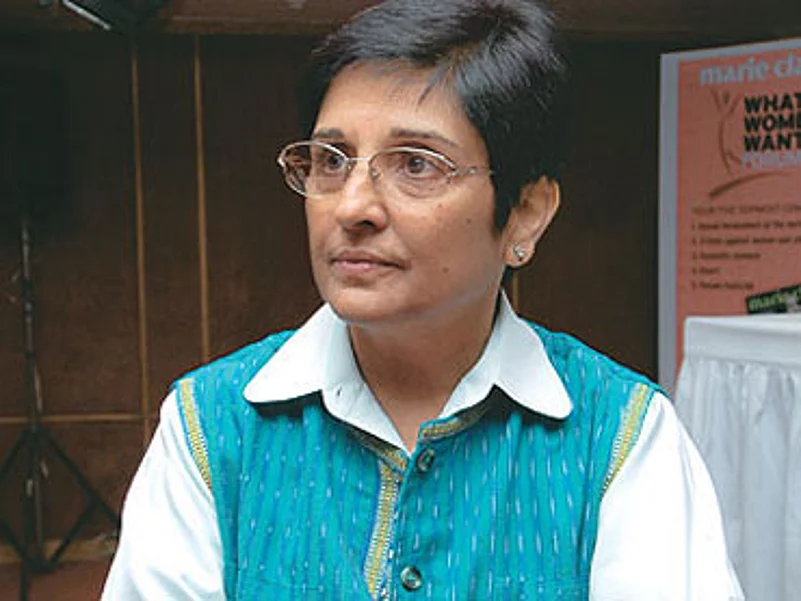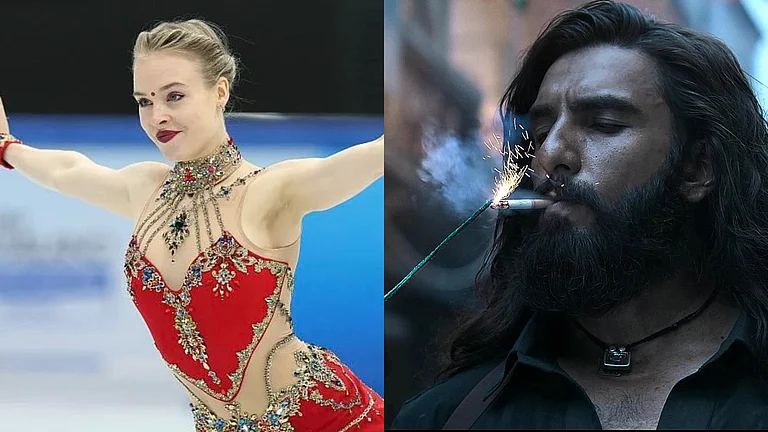What do Aamir Khan and Kiran Bedi have in common? Not much, you might say, apart from being public figures who sometimes get into trouble for the things they say and do. The Bollywood star alleged to have a sensitive, brooding side, and the tough former cop allegedly unburdened by such personality traits, are not even on the same side of the Olympic torch controversy. Aamir will run; Kiran, it now turns out, won't.
What they do have in common, however, is the knots they've tied themselves into while explaining their positions on this controversy, if you can call them positions. When Kiran first articulated hers ten days ago, the air was thick with 'high-level' Indian assurances of 'watertight' security arrangements for the Olympic torch's journey through the capital, to keep Chinese face. The relay run with the torch, it was clear, even to someone who has never worn a police uniform, was going to be a regulated affair, and not a joyous and untrammelled expression of the Olympic spirit. And while Tibetan protesters were unlikely to be brutally strong-armed (since India is rather more constrained in these matters than Nepal next door, which has cracked down on them to please the Chinese), it was safe to assume that they wouldn't be allowed to get anywhere near the torch after the wall-scaling shenanigans last month at the Chinese embassy.
There are people who would feel queasy about running against such a backdrop, but Kiran didn't appear to be one of them—then. Her position was crisp and unambiguous: "My run is in the cause of the Olympics—which is to uphold sportsmanship while representing justice and fair play. Having been a former tennis champion, I cherish these values." Opposing the boycott of the Olympics that Tibetan organisations were campaigning for, she said: "We can certainly find other non-hurtful ways of espousing causes dear to us." Now, dramatically, and somewhat implausibly, a woman who has spent a lifetime rubbing shoulders with lathi-wielding heavies, and has been known to wield a mean lathi herself, finds herself feeling like a "caged woman" because barricades are being erected and there are going to be cops everywhere. So what is all that about: reality sinking in slowly? Belated unease at being identified too closely with the establishment position on a controversy? Or perhaps, an attempt to share the intense international publicity being generated by a cause, while avoiding actually supporting it?
And then there's Aamir. Now, everybody knows blogs are designated spaces for the self-indulgent outpourings of fevered minds, and require a suspension of disbelief on the part of the reader. But when a celebrity of high megawattage says "Read my blog" on a subject of intense media interest, he is virtually inaugurating a festival of deconstruction. And so it has come to pass that Aamir's 500-odd words are being taken apart both in blogosphere and the real world, and found sadly wanting. Despite the swirling stories about the influence of Coke on Aamir's position (he is brand ambassador for Coke, which is a 'global partner' of the 2008 Olympics and the 'presenting partner' of the Olympic torch relay), it's quite clear that Coke's media managers had no hand in the writing of his statement. People adept at glibly negotiating a murky world of accusations about their complicity in exploiting groundwater and selling drinks laced with pesticides are unlikely to have come up with anything quite so tortured. As battle-hardened professionals, they know that in some cases less is more, and would probably have advised the blogger to keep it crisp: the Olympic Games belong not to China but the world, and that's why I'm running on April 17. End of argument.
Aamir, however, has come up with a justification that reeks so much of hand-on-my-heart sincerity that it sounds dreadfully insincere. He doesn't just have "highest regard and respect" for the struggles of the Tibetans, but "completely empathises" with them, and his "heart goes out to them". What's more, he gets "deeply upset" when anyone's human rights anywhere in the world are violated, including Iraqis, Kashmiris and Palestinians. In short, he sounds exactly like the sort of person who would want to make a grand gesture in support of the Tibetans, and not be meekly content with saying a silent prayer for them "in my heart" while he runs. It's the sort of moral stance that begs a question that has come to haunt Aamir: well, if you feel so strongly about all this stuff, why don't you do something about it? It's also the sort of moral stance that has led to Aamir's relationship with Coke being projected by his critics as a Faustian pact that forces the actor to keep choosing between morality and Mammon. Those conversant with the arcane world of celebrity endorsements say this is all speculation since no one has actually seen the fine print of his contract with Coke, which could be less binding than presumed. In other words, he may or may not be a bonded corporate slave. We don't really know.
If he isn't one, what do his tortured arguments arise from? The manipulations of an acutely image-conscious star trying to burnish his halo by dabbling in causes without burdening himself by committing to them? Or the unpremeditated wanderings of a man with a social conscience in a fraught and complex world that he wants to identify with, but doesn't, as he disarmingly put it once, have "the bandwidth" to understand? In other words, is he an opportunistic crusader, or merely a confused one?

It's only quite recently that liberals have begun asking those questions about Aamir Khan, a star who used to be admired for having quietly helped victims of the Mumbai riots in the 1990s, and having had the courage to speak out against Narendra Modi when many of his peers didn't dare after the Gujarat riots. As Aamir's positions became more complicated, the questions began to flow, especially after he dropped in on a sit-in at Jantar Mantar in Delhi in 2006 with the team of his new film Rang De Basanti to express solidarity with Narmada oustees. While Aamir said his was a spontaneous gesture, sceptics suspected otherwise, accusing him of planning the encounter as a "photo-op" for his anti-establishment film. And, as if to prove them right, when social activists, notably Arundhati Roy, put pressure on Aamir to clarify where he stood, and asked whether he could reconcile his support for causes like Narmada with his endorsement of Coke, given the controversies around it, he backed off.
The controversy died down, but it did put in place a pattern that has tended to repeat itself with Aamir: of measuring him against expectations that he himself has helped to raise—and finding him wanting. When he promoted his film, Tare Zameen Par (on the travails of a dyslexic child through the educational system), on the Sa Re Ga Ma's Li'l Champs programme, in which children are egged on to win by insanely competitive parents, critics asked, with some justification: why is he gracing a contest that "espouses the very values his film tries to resist?" When he goes to the trouble of organising a special screening of TZP for L.K. Advani, they wonder: is it being done to ensure smooth passage for the film in Gujarat (which eventually does come to happen)? And ask: Has Aamir learnt to be pragmatic in his dealings with the BJP since the days when his Fanaa was not allowed to be released in Gujarat because he took on Modi?
In fairness to him, he raised no expectations that he would take a stand in support of the Tibet issue. Nor did he go seeking controversy—it came looking for him, when the issue escalated. But he has fanned the flames by painting a picture of himself as a tormented torch-bearer, running to honour the Olympics with the weight of planetary human rights violations on his head, when he might have doused them with a straightforward response.
Overly-scripted arguments for running or, in the case of Kiran, not running, really aren't necessary. The Olympic relay does pose a dilemma for the government, in terms of balancing its commitments to China with the democratic rights of refugees and other protesters, but it doesn't pose quite the same dilemma for individuals, who are free to follow their instincts. While there is considerable media interest, sympathy for Tibetans, and a strong undertow of anti-China sentiment, public opinion is not so strong or developed on the issue in India that it should constrain celebrities into taking intellectually mangled positions. It's perfectly OK to be Baichung Bhutia, and not run out of sympathy for Tibetans. It's also OK to be Sachin Tendulkar, Milkha Singh, Manavjit Singh Sandhu, and so on, and run. What's not OK is doublespeak.


























